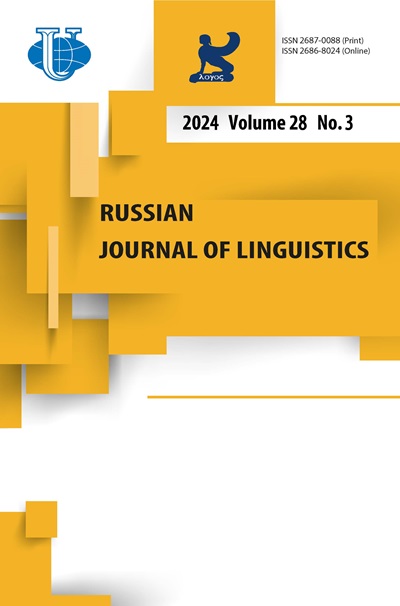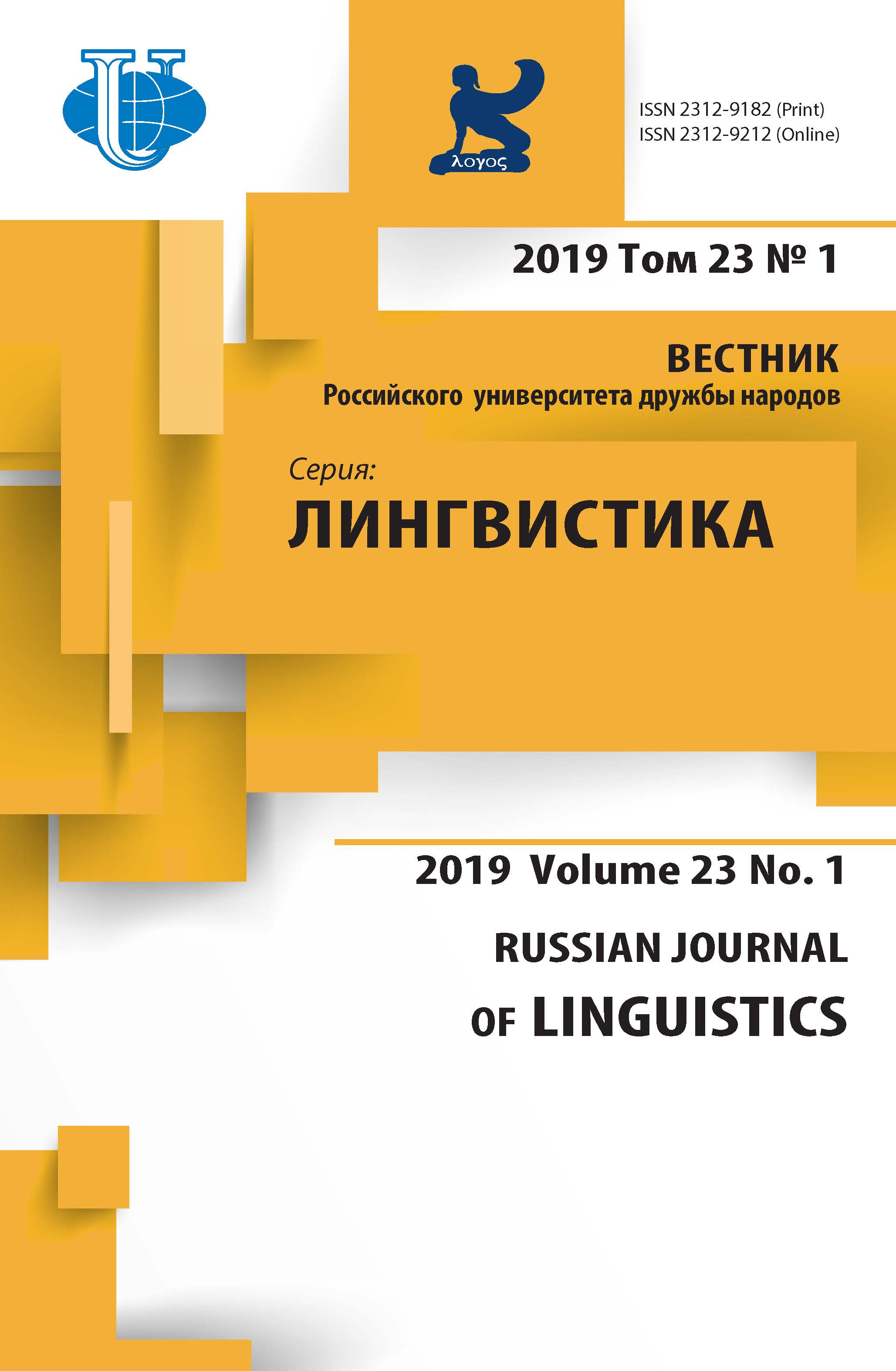Отражение иерархии ценностей в пословичном фонде русского и французского языков
- Авторы: Нелюбова Н.Ю.1, Хильтбруннер В.И.2, Ершов В.И.3
-
Учреждения:
- Российский университет дружбы народов
- Венский экономический университет
- Одинцовский филиал МГИМО МИД России
- Выпуск: Том 23, № 1 (2019)
- Страницы: 223-243
- Раздел: ЯЗЫК И КУЛЬТУРА
- URL: https://journals.rudn.ru/linguistics/article/view/20625
- DOI: https://doi.org/10.22363/2312-9182-2019-23-1-223-243
Цитировать
Полный текст
Аннотация
В статье рассматривается отражение основных ценностей русских и французов в пословицах - языковых единицах, наиболее ярко демонстрирующих национальные ценностные ориентиры. Исходя из того, что каждый народ имеет определенную совокупность иерархически организованных ценностей, которые частично перекликаются с ценностями в других культурах, но могут иметь свои особенности, актуальным представляется выявление как универсального, так и уникального - собственно национального, что позволяет не только выстроить иерархию ценностей того или иного народа, но и провести сопоставительный анализ различных лингвокультур в аксиологическом ключе. Для получения общего представления об отражении ценностей и их иерархии в пословицах нами было проведено исследование русского и французского лексикографического материала. Согласно нашей гипотезе тематические классификации - выделенные авторами словарей темы и их формулировка - позволяют прямо или косвенно выявить ценности того или иного народа, а количественный подсчет пословиц, приведенных в рамках каждой темы, может дать представление об иерархии ценностей: большее или меньшее количество пословиц на определенную тему свидетельствует о степени ее важности в сознании представителя соответствующего языка и культуры. В статье приведены предварительные данные исследования, выполненного на ограниченном материале с целью апробации избранной авторами методики. Картотека содержит более 2400 русских и французских пословиц, извлеченных из специальных лексикографических источников путем сплошной выборки. Акцент был сделан на французском практическом материале, а русский послужил фоном для сопоставительного анализа. Произведен подсчет количества пословиц в рамках каждой темы, представлены данные, позволяющие судить об общей картине иерархии ценностей (темы перечислены в порядке убывания количественного показателя), а также результаты сопоставительного анализа. Проведенное исследование подтвердило возможность выявления основных ценностей народа, построения их иерархии и определения ценностной доминанты на основе анализа пословичного фонда, в частности, названия рубрик тематической классификации, обозначенной в лексикографических источниках, и количества единиц в каждой теме. Полученные результаты позволяют уточнить представление о языковой картине мира русских и французов и могут найти применение в процессе лингвоаксиологического анализа различных языков.
Ключевые слова
Об авторах
Наталия Юрьевна Нелюбова
Российский университет дружбы народов
Автор, ответственный за переписку.
Email: nat.nelubova@mail.ru
кандидат филологических наук, доцент, доцент кафедры иностранных языков филологического факультета РУДН
Москва, 117198, ул. Миклухо-Маклая, 10-2Виктория Игоревна Хильтбруннер
Венский экономический университет
Email: victoria.hiltbrunner@wu.ac.at
кандидат филологических наук, преподаватель кафедры славянских языков Венского экономического университета
Австрия 1020, Вена, Вельтхандельсплатц 2Виктор Иванович Ершов
Одинцовский филиал МГИМО МИД России
Email: ershovik@mail.ru
кандидат филологических наук, доцент, доцент кафедры Лингвистики и переводоведения Одинцовского филиала МГИМО МИД России
Московская область, г. Одинцово, ул. Ново-Спортивная, 3Список литературы
- Абульханова К.А. Российский менталитет: кросс-культурный и типологический подходы // Российский менталитет: вопросы психологической теории и практики. М: Институт психологии РАН, 1997. [Abulkhanova, K.A.(1997). Rossiysky mentalitet: kross-kulturny i tipologicheskiy podhody (Russian mentality: cross-cultural and typological approaches). Rossiysky mentalitet: voprosy psihologicheskoi teorii i praktiki. M. Institut Psihologii RAN. (In Russ.)].
- Алефиренко Н.Ф. Поэтическая энергия слова (синергетика языка, сознания и культуры). М., 2002. [Alefirenko N.F. (2002). Poeticheskaya energiya slova (sinergetika yazyka, soznaniya i kultury) (Poetic power of the word (synergy of the language, mentality and culture). (In Russ.)].
- Байрамова Л.К, Иванова М.В. Русская культура в «Аксиологическом фразеологическом словаре русского языка» // Проблемы истории, филологии, культуры. 2014. № 3. C. 10—12. [Bairamova L.K., Ivanova M.V. (2014). Russkaya kultura v Aksiologicheskom frazeologicheskom slovare russkogo yazyka. (Russian culture in the Axiological fixed phrases dictionary of the Russian language). Problemy istorii, filologii, kultury (Problems of history, philology, culture), 3, 10—12. (In Russ.)].
- Байрамова Л.К. Пословицы в «Аксиологическом фразеологическом словаре русского языка: словаре ценностей и антиценностей» // Вестник Новгородского государственного университета. 2014. № 77. С. 10—12. [Bairamova L.K. (2014). “Poslovitsy v ‘Aksiologicheskom frazeologicheskom slovare russkogo yazyka: slovare tsennostey i antitsennostey’”. (“Proverbs in the ‘Axiological fixed phrases dictionary of the Russian language: dictionary of values and antivalues’”). Vestnik Novgorodskogo gosudarstvennogo universiteta, 77, 10—12 (In Russ.)].
- Безкоровайная Г., Ломакина О.В., Макарова А.С. Лингвокультурологический потенциал фразеосимвола: общее и национально-специфическое (на материале фразеологизмов с компонентом-символом МЕЧ/SWORD/LE GLAIVE в русском, английском и французском языках) // Филология и культура. 2017. № 4 (50). С. 6—10. [Beskorovainaya G., Lomakina O.V., Makarova A.S. (2017). Lingvokulturologicheskiy potentsial frazeosimvola: obshee i natsionalno-spetsificheskoye (na materiale frazeologizmov s komponentom-simvolom MECH/ SWORD/LE GRAIVE v russkom, anglijskom i frantsuzskom yazykah. (Linguistic and cultural potential of a phrasal symbol: common and cultural specificity (based on the material of fixed phrases with a symbol-component MECH/SWORD/LE GLAIVE in Russian, English and French). Filologiya i kultura. Philology and culture, 4 (50), 6—10 (In Russ.)].
- Борисова А.С., Кургузенкова Ж.В., Никишин В.Д. Проблема перевода религиозно-экстремистских текстов в процессе судебной лингвистической экспертизы // Вестник РУДН. Серия: Лингвистика. 2018. Т. 22. № 2. С. 448—473. [Borisova A.S., Kurguzenkova Zh.V., Nikishin V.D. (2018). Problems of translation of the religious extremist texts in the process of the forensic linguistic examination. Russian Journal of Linguistics, 22 (2), 448—473. (In Russ).].
- Вальтер Х., Мокиенко В.М. Антипословицы русского народа. Спб.: Нева, 2006. [Valter H., Mokienko V.M. (2006). Antiposlovitsy russkogo naroda. (Antiproverbs of the Russian people). Saint Petersburg: Neva. (In Russ.)].
- Владимирова Т.Е. Русский дискурс в межкультурной коммуникации. Экзистенциально-онтологический подход. Изд. 3-е, перераб. и доп. М.: Ленанд, 2018. [Vladimirova T.E. (2018). Russkiy diskurs v mezhkulturnoi kommunikatsii. Ekzistentsialno-ontologicheskiy podhod. (Russian discourse in the cross-cultural communication. Existential and ontological approach). 3rd edition. Moscow: LENAND, 320 p. (In Russ.)].
- Гибатова Г.Ф. Аксиология в языке // Вестник ОГУ. 2011. № 2 (121)/февраль. С. 127—132. [Gabaitova G.F. (2011). Aksiologiya v yazyke. (Axiology in the language). Vestnik OGU, 2 (121), 127—132. (In Russ.)].
- Иванова С.В. Подходы к составлению лингвокультурологического словаря // Вестник Оренбургского государственного университета. 2002. № 6. С. 174—176. [Ivanova, Svetlana (2002). Podkhody k sostavleniyu lingvokul'turologicheskogo slovarya (Approaches to the compilation of linguistic culturological dictionary). Vestnik Orenburgskogo gosudarstvennogo universiteta (Bulletin of Orenburg State University), 6, 174—176. (In Russ.).]
- Иванова С.В., Чанышева З.З. Лингвокультурология: проблемы, поиски, решения. Уфа: РИЦ БашГУ, 2010. [Ivanova, Svetlana, Chanysheva, Zul’fira (2010). Lngvokul’turologiya: problemy, poiski, resheniya (Linguoculturology: problems, quests, solutions). Ufa: RIC BashGU. (In Russ.)]
- Караулов Ю.Н. Русский язык и языковая личность. 4-е изд. М.: URSS, 2004. 8-е изд. URSS, 2017. С. 52—53. [Karaulov Yu.N. (2004). Russkiy yazyk i yazykovaya lichnost'. (The Russian language and language personality). 4th edition. Moscow: USSR. 52—53. (In Russ.)].
- Кацюба Л. Б. Нравственные ценности русских паремий как фактор духовной безопасности. Вестник Челябинского государственного университета. 2013. № 21 (312). Филология. Искусствоведение. Вып. 80. С. 277—280. [Katsyuba L.B. Nravstvennyye tsennosti russkikh paremiy kak faktor dukhovnoy bezopasnosti. [(Katsyuba L.B. (2013). Moral Values of Russian Paremias as a Factor of Spiritual Security. Bulletin of Chelyabinsk State University, 21. Philology. Art Criticism. Issue 80, 277—280 (In Russ.)].
- Логинова П.Г. Лингвокультурный концепт «вино» в языковом сознании французов // Вестник РУДН. Серия: Лингвистика. 2016. Т. 20. № 2. С. 31—45. [Loginova P.G. (2016). Linguistic and cultural concept “wine” in the language mentality of the French people. Russian Journal of Linguistics, 20 (2), 31—45. (In Russ.)].
- Лотман Ю.М. Избранные статьи в трех томах. Т. 1. Таллинн: Александра, 1992. [Lotman Yu.M. (1992). Izbrannye stat'i v treh tomah. (Selected articles in three volumes). Tallinn: Vol. 1, Alexandra, 1992. (In Russ.].
- Маслова В.А. Культурный символ и его роль в создании национальных ценностей // Язык. Ментальность. Культура. М., 2010. Т. 1. С. 65—67. [Maslova V.A. (2010). Kulturnyi simvol i ego rol' v sozdanii natsionalnyh tsennostey. (Cultural symbol and its role in creating values). Yazyk, mentalnost', kultura. Language, mentality, culture. Vol. 1. 65—67. (In Russ.)].
- Маслова В.А. СТРАННИК в русской лингвокультуре: ценность, концепт, образ? // Вестник РУДН. Серия: Лингвистика. 2015. № 3. С. 23—31. [MaslovaV.A. (2015). STRANNIK v russkoi lingvokulture: tsennost', kontsept, obraz? (STRANGER in the Russian language and culture: value, concept, image). Russian Journal of Linguistics, 3, 23—31. (In Russ.)].
- Мокиенко В.М. Современная паремиология (лингвистические аспекты). Мир русского слова. 2010. № 3. С. 6—20. [Mokiyenko V.M. (2010) Sovremennaya paremiologiya (lingvisticheskiye aspekty). The Modern Paremyology (Linguistic Aspects). Mir russkogo slova, 3, 6—20. (In Russ.)]
- Стернин И.А. Коммуникативное поведение в составе национальной культуры // Этнокультурная специфика языкового сознания. М., 1996. С. 97—112. [Sternin I.A. (1996). Kommunikativnoye povedeniye v sostave natsionalnoi kultury. (Communicative behavior within the national culture). Ethnocultural peculiarity of the language mentality. Moscow, 97—112. (In Russ).].
- Тер-Минасова C.Г. Язык и межкультурная коммуникация. М.: Изд-во МГУ, 2004. [Ter-Мinassova S.G. (2004). Yazyk i mezhkulturnaya kommunikatsiya. (Language and cross-cultural communication). Moscow: Moscow State University Publishing house. (In Russ.)].
- Bréchon P. (2000). Les valeurs des Français. Evolution de 1980 à 2000. (The values of the French people. Evolution from 1980 to 2000). P.: Armand Colin.
- Gallard O, Roudet B. (2014). Une jeunesse différente? Les valeurs des jeunes Français depuis 30 ans. (Different youth? Values of the French youth from 30 and under age) P.: La documentation Française.
- Larina, Tatiana, Arto, Mustajoki, and Ekaterina Protassova (2017). Dimensions of Russian culture and mind. In Katja Lehtisaari and Arto Mustajoki (eds.) Philisophical and Cultural Interpretations of Russian Modernisation. Series: Studies in Contemporary Russia. London/New-York: Routledge, 7—19.
- Larina, Tatiana, Vladimir Ozyumenko, and Svetlana Kurteš (2017). I-identity vs WE-identity in language and discourse: Anglo-Slavonic perspectives. Lodz Papers in Pragmatics, 13 (1), 2017, 109—128.
- Фелицына В.П., Прохоров Ю.Е. Русские пословицы, поговорки и крылатые выражения. Лингвострановедческий словарь под редакцией Е.М. Верещагина и В.Г. Костомарова. М.: Русский язык, 1979. [Felitsina V.P., Prohorov Yu.E. (1979). Russkie poslovitsy, pogovorki i krylatiye vyrazheniya. (Russian proverbs, sayings and winged words). Lingvostrannovedcheskiy slovar' pod reduktsiyei E.M. Vereshagina i V.G. Kostomarova. (Dictionary of linguistic and cultural studies. Editors: Kostomarov V.G. and Vereshagin M.V.). M.: Russian language. 1979. (In Russ).].
- Montreynaud, F., Pierron, A., Suzzoni F. (2010). Dictionnaire de proverbes et dictons. (Dictionary of proverbs and sayings). P.: Le Robert, 2010.

















